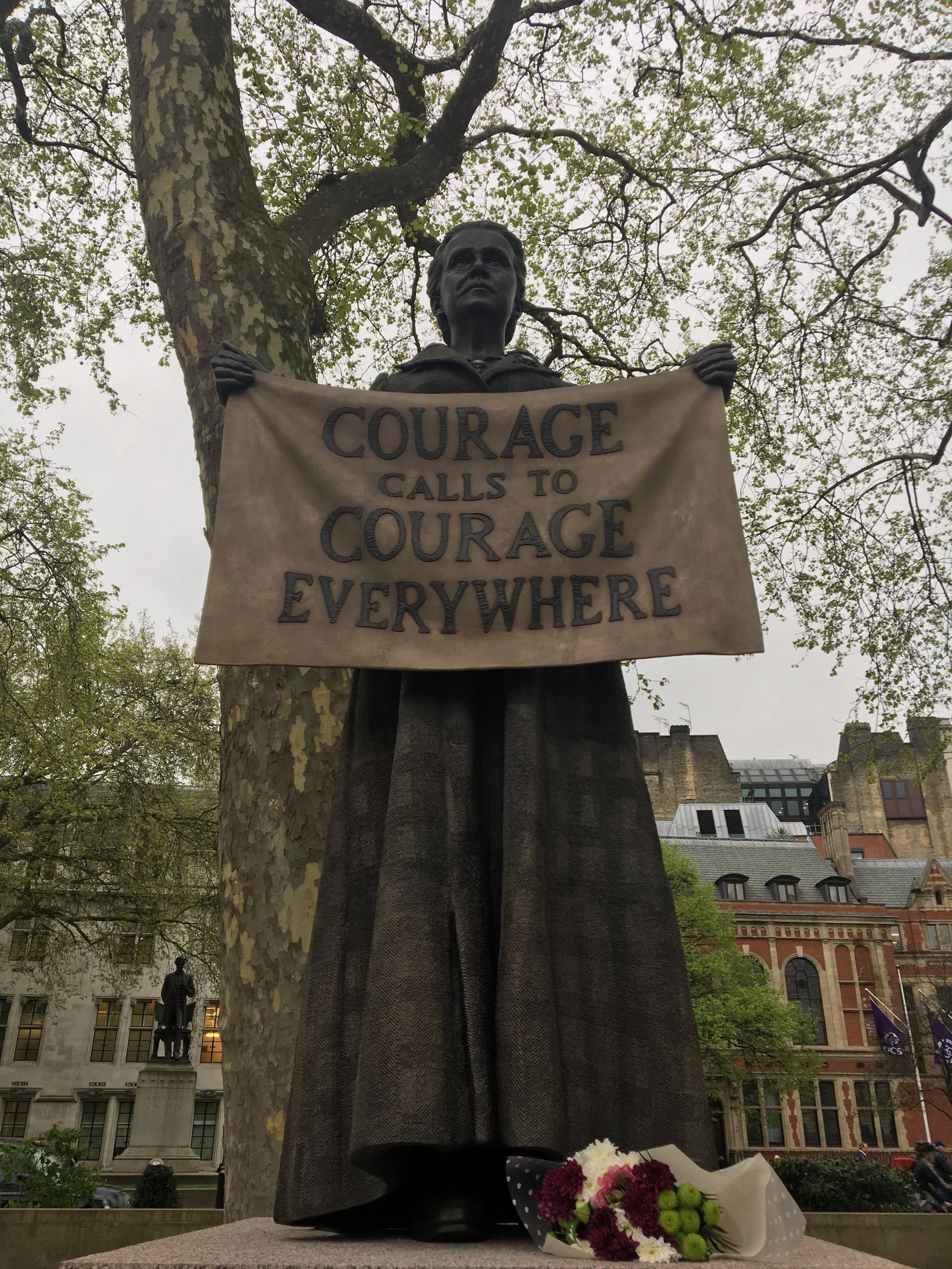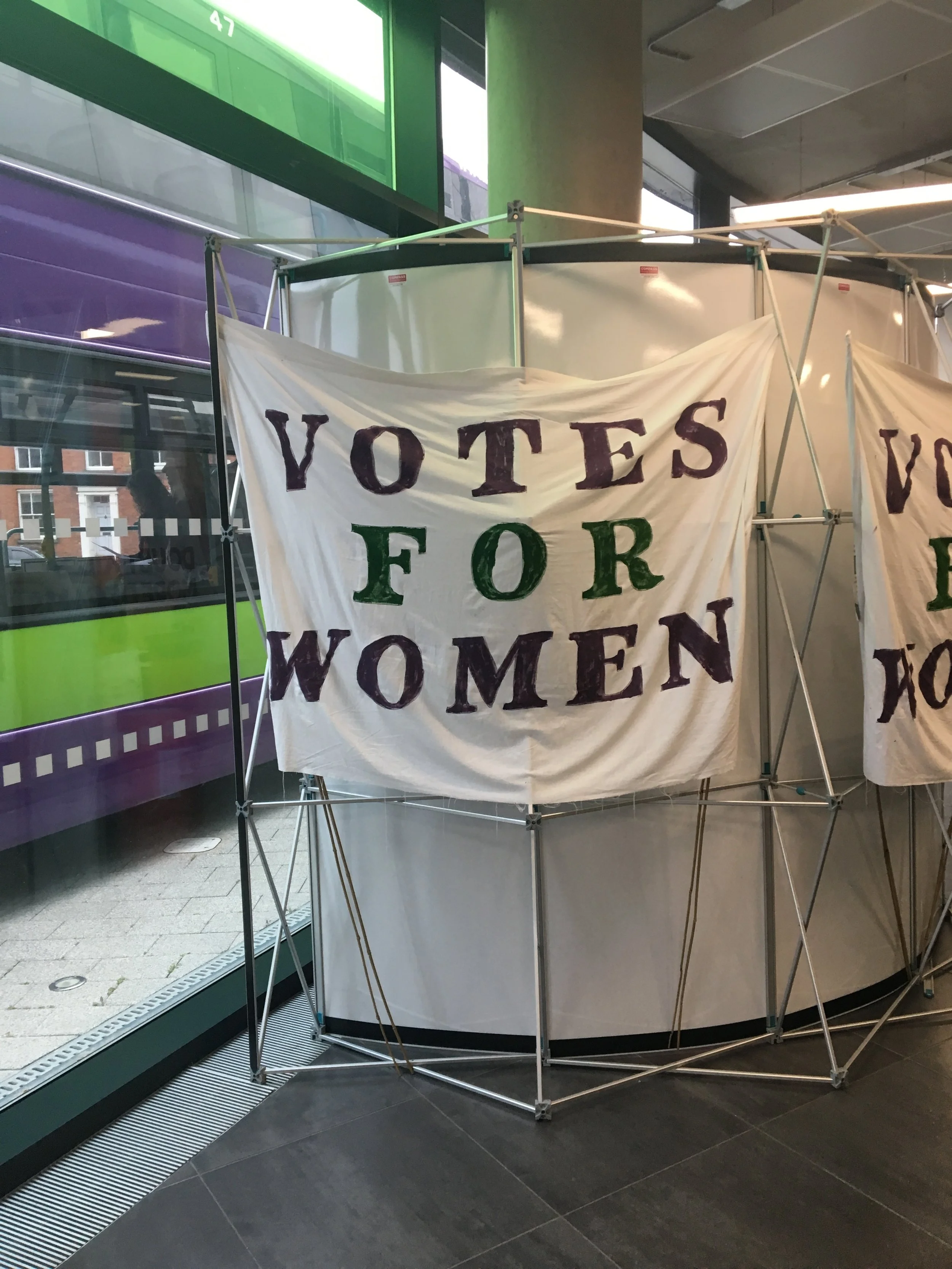Unconventional Mentor no. 6 - Millicent Fawcett
"Courage calls to courage everywhere and its voice cannot be denied"
The statue of Millicent Fawcett in Parliament Square, London
I have been planning this project for a long time, and most of the Unconventional Mentors I feature have inspired me for years, but who to post about each week has very much been influenced by what is going on in my own life when I sit down to write. This week I had the complete privilege of attending the Women’s Voices, Women’s Votes Festival for Women in Ipswich so it felt very appropriate to post about one of my Unconventional Mentors who was instrumental in securing women the right to vote. The festival was a celebration of the first women getting the vote 100 years ago, with talks and interactive stands looking at the challenges facing women in the world today and the festival would not have been possible were it not for the work of this week’s Unconventional Mentor Millicent Fawcett.
Votes for Women banner at the Women’s Festival, Ipswich, UK 6th October 2018
While it is often the work of Emmeline Pankhurst and the suffragettes that we associate with women getting the vote, the work of the suffragists was as important if not more important in ensuring that the legislation was changed, and Millicent Fawcett was the leader of this group in her role as president of the National Union of Women’s Suffrage Societies (NUWSS). I am ashamed to say that this is an area of history that I don’t know much about. Despite studying history to A-level most of my history lessons ignored the history of women, and we certainly never learnt about suffragists, suffragettes or any other of the influential people in the women’s movement over the last 100 years. I am making up for lost time now.
Millicent Fawcett was born in 1848 in Aldeburgh, Suffolk and began her political career at the age of 22. She campaigned for women to be allowed to vote throughout her whole life and was in her 70s when the law that allowed some women to vote was passed in 1918. As well as campaigning for the right to vote, Millicent was also a founder of Newnham College Cambridge which was one of the first universities for women, and she campaigned on many other issues that were adversely impacting women.
The work of Millicent Fawcett has recently been commemorated with a statue in Parliament Square, London, UK, the first of a woman ever to be placed there. It was made by Gillian Wearing and came about because of a petition by Caroline Criado Perez.
When the statue was unveiled I went to see it after work and got very emotional looking at it and all the other women who had come to see it and what it meant for them. A little boy with his mum shouted “International Women’s Day” as if this celebration was now a monthly thing and a little girl was listening to her Mum explain the statue to her. It marks the start of what I hope will be many public monuments to celebrate the amazing women who have made contributions to the UK and beyond. What I also love about the statue is that around the bottom, the names and photographs of many of the other women who contributed to women getting the vote are also remembered, ensuring we remember that it was many people working together that helped to make this change happen. This statue is amazing, but one statue is not enough, we need to tell the stories of all the women who have contributed to our society. We need to remember that when women got the vote it wasn’t all women. That when white women have a platform to talk women of colour often do not. That spaces which you can enter to have you voice heard can be exclusionary to women with disabilities. That your background, your upbringing and your education can mean that your story gets heard over someone else who hasn’t had the opportunities you have. The day the statue was unveiled was a brilliant day for women, but it is just the beginning.
Mentor advice: Stay true to your beliefs and values
The advice that I take from Millicent Fawcett is to trust in what you believe is right and no matter how long it takes your vision to come to fruition, stay true to your beliefs and values.
Millicent attended her first meeting about women’s suffrage in the 1860s when she was 22 and it wasn’t until 1918, when she was in her 70s that women got the vote. Her success was very much a lifetime of work. Throughout all that time Millicent not only continued to champion for women to have the vote, but she refused to undertake or support militant or violent actions like those that the suffragettes were promoting. She didn’t believe that these actions would help the cause, so she stuck to her beliefs.
I feel that today we live in a world where information is available to us instantly, and we expect to progress in our careers and businesses so quickly. There seems to be little value in doing work that takes time and effort to craft. I have spent upwards of 5 years working in the same organisations but have seen people around me come and go in months rather than years, and heard colleagues feel frustration that they aren’t progressing quickly enough. I see people on Instagram frustrated that their numbers aren’t growing quickly enough, or their businesses aren’t where they want them to be with only a few weeks or months work behind them. When this happens, there is a temptation to do the work that will get you the quickest result, the next promotion or the most followers, rather than what is true to your beliefs and values. And it often ends in disappointment. If we look to Millicent Fawcett, and understand that work worth doing will take time, then perhaps we can spend less time worrying about how quickly we are making progress and focus on the quality of the work we are doing instead.
To find out more information about Millicent Fawcett and how her legacy continues to support gender equality and the rights of women then check out The Fawcett Society

